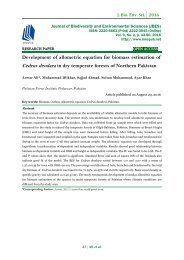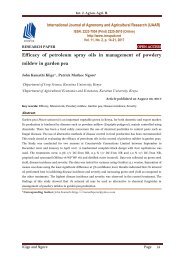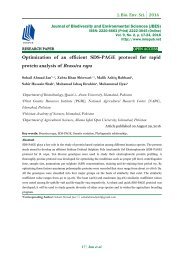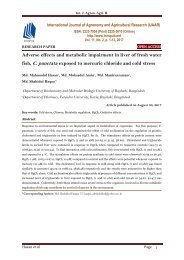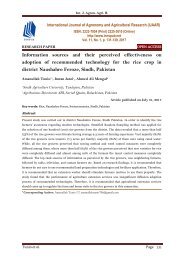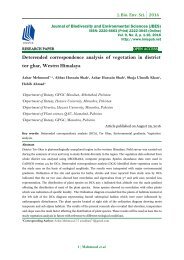Comparative analysis of some biochemical responses of winter and spring wheat cultivars under low temperature
Abstract To compare changes of biochemical indices between spring (Kavir) and winter (Azar2) cultivars of wheat (Triticum aestivum L.) under low temperature, 14 days old wheat seedlings were exposed to cold. The seedlings were transferred into growth chamber for 9 days at 5/3 °C (day/night) as cold treatment, or at 20/18 °C as control. Proline content, total protein accumulation, activities of superoxide dismutase (SOD), catalase (CAT) and peroxidase (POD) enzymes, were assayed in the leaf extracts of control and cold treated plants. The results showed that cold led to an accumulation of proline and an increase in protein level, especially in winter cultivar. Rapid increases in proline and protein accumulations were observed during early stages of cold stress. SOD activity displayed no significant differences between the two cultivars during the first 3 days after cold stress, while in Azar 2, the level of SOD activity was gradually increased after 3 days of cold stress. The POD and CAT activity were higher in plants grown at cold stress than in the controls; however, their rate was different in winter and spring wheat cultivars. In general, Azar2 showed relatively higher POD and CAT activity compared to Kavir. Regarding antioxidant enzymes activities, cultivars respond differently under cold stress.
Abstract
To compare changes of biochemical indices between spring (Kavir) and winter (Azar2) cultivars of wheat (Triticum aestivum L.) under low temperature, 14 days old wheat seedlings were exposed to cold. The seedlings were transferred into growth chamber for 9 days at 5/3 °C (day/night) as cold treatment, or at 20/18 °C as control. Proline content, total protein accumulation, activities of superoxide dismutase (SOD), catalase (CAT) and peroxidase (POD) enzymes, were assayed in the leaf extracts of control and cold treated plants. The results showed that cold led to an accumulation of proline and an increase in protein level, especially in winter cultivar. Rapid increases in proline and protein accumulations were observed during early stages of cold stress. SOD activity displayed no significant differences between the two cultivars during the first 3 days after cold stress, while in Azar 2, the level of SOD activity was gradually increased after 3 days of cold stress. The POD and CAT activity were higher in plants grown at cold stress than in the controls; however, their rate was different in winter and spring wheat cultivars. In general, Azar2 showed relatively higher POD and CAT activity compared to Kavir. Regarding antioxidant enzymes activities, cultivars respond differently under cold stress.
Create successful ePaper yourself
Turn your PDF publications into a flip-book with our unique Google optimized e-Paper software.
Int. J. Agri. & Agri. R.<br />
signaling <strong>and</strong> destruction. Physiologia Plantarum<br />
126, 45-51.<br />
Szabados L, Savoure A. 2010. Proline: a<br />
multifunctional amino acid. Trends in Plant Science<br />
15, 89-97.<br />
Szalai G, Pap M, J<strong>and</strong>a T. 2009. Light-induced<br />
frost tolerance differs in <strong>winter</strong> <strong>and</strong> <strong>spring</strong> <strong>wheat</strong><br />
plants. Journal <strong>of</strong> Plant Physiology 166, 1826-1831.<br />
Urquiaga I, Leighton F. 2000. Plant polyphenol<br />
antioxidants <strong>and</strong> oxidative stress. Biological Research<br />
33, 55-64.<br />
Wang X, Li W, Li M, Welti R. 2006. Pr<strong>of</strong>iling lipid<br />
changes in plant response to <strong>low</strong> <strong>temperature</strong>s.<br />
Physiologia Plantarum 126, 90-96.<br />
Yeh S, et al. 2000. Chitinase genes responsive to<br />
cold encode antifreeze proteins in <strong>winter</strong> cereals.<br />
Plant Physiology 124, 1251-1264.<br />
Tahmasebi <strong>and</strong> Pakniyat<br />
Page 22





![Review on: impact of seed rates and method of sowing on yield and yield related traits of Teff [Eragrostis teff (Zucc.) Trotter] | IJAAR @yumpu](https://documents.yumpu.com/000/066/025/853/c0a2f1eefa2ed71422e741fbc2b37a5fd6200cb1/6b7767675149533469736965546e4c6a4e57325054773d3d/4f6e6531383245617a537a49397878747846574858513d3d.jpg?AWSAccessKeyId=AKIAICNEWSPSEKTJ5M3Q&Expires=1719187200&Signature=3d8%2BvBW5ioNSNOZLudd04WrCUXw%3D)







